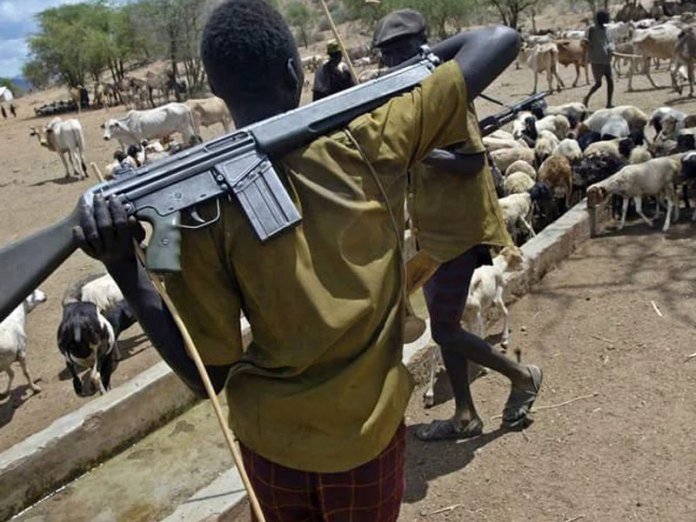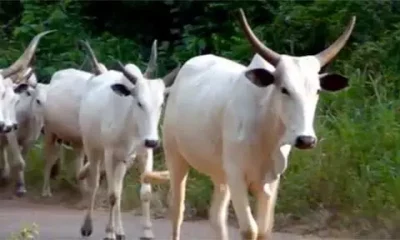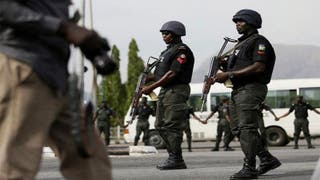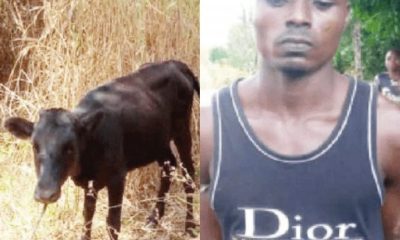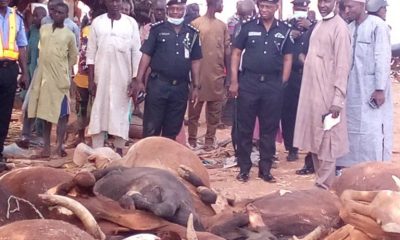News
TuesdayRapAround: Dissecting Cattle Ranching, Grazing, Colony In Nigeria

Dissecting Cattle Ranching, Grazing, Colony In Nigeria By Michael Ayotunde
Simply put, this is all about livestock raising.
By-products from this agriculturally-endowed resource inlcude but not limited to milk and other diary products such as butter, cheese, sour cream, ice cream, and even hamburgers.
Cattle rearing, as a form of agro-business, is not peculiar to Nigeria alone. In fact, it is an age-long trade that cut across the global landscape.
What has however remain a peculiar trend in Nigeria, as opposed to what is obtainable the world over, is the wanton destruction of farmlands, property, senseless killings, raping and all sorts of atrocious tendency. These other sides of this agro-business which are peculiar to Nigeria, is clearly not the same in other lands.
In fact, a statement was creditted to Nigeria’s immediate neighbour, Ghana, where the president of the country was reported to have issued a stern warning to weild the big stick against anyone found rearing cattle in the open.
Sadly, it is only in Nigeria you see cows using pedestrian bridges, found in classrooms. Note that pedestrian bridges are rarely found in villages, but in cosmopolitan city centers.
One fact that can’t be taken away, however, is that it remains a money-spinning venture which have metamorphosed from crude method into a more fascinating and sophisticated system. But why operators in Nigeria, for instance, choose to stick with the crude method of doing the business is certainly not comprehensible.
In developed nations of the world, like the United States of America, USA, it is a type of agro-trade that is done with dignity and decorum, with utmost regard to laid down rules, orderliness and environmental regulations.
Like the case in Nigeria where innocent lives are being cut ceaselessly, and in a manner that defies reasonable thinking; with the government and security agencies looking seemingly helpless to halt the avoidable human carnage, it is never the case in other lands.
In fact, it is on record that the United State is the largest producer of meat in the world. Yet, we do not hear where herders in US are seeing or caught killing other farmers and or innocent people while raising their cattle.
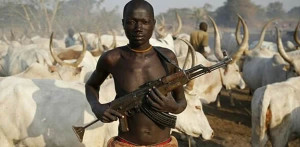
Around 1800s, it’s on record that ranchers in the US set their cattle and sheep loose to roam the streets. But that has changed with time. New innovation and technology are being employed now. They have since moved on from the old, archaic method.
Report has it that average American consume 101 pounds of meat each year, a number which has quadrupled since 1960s. While the US is still the largest producer of meat in the world, countries such as Argentina and Brazil are closing the gap.
At a time and as a way of coping with the growing number of cattle, what’s today known as CAFOs (Concentrated Animal Feeding Operations) were established. There and then, the locations were dedicated to raising cattle before heading to slaughter slab or for other purposes.
With this however, the challenge still include the amount and or quantity of gallons of water, tons of feeds, corn and other crop that are required to feed the cattle, to make them good and healthy for human consumption.
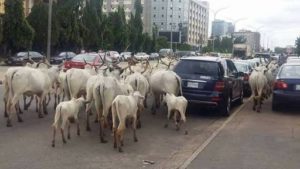
Aside what is required to keep the animals in good shape, the environmental problem is also another worry. It is said that they use most resources to maintain the animals, take a lot of farmlands, while also supplying an unhealthy amount of methane into the atmosphere. These among others were part of the reasons the US placed embargo on meat importation from other countries for several years, until former president Barrack Obama lifted the ban.
If beef production is this dangerous in the US, a nation with stiffer regulations, now imagine what the situation would look like in a country like Brazil, Nigeria with little or no health and environmental regulations.
In Brazil, for instance, rapid deforestation of the amazon is a major challenge. It has also been given dangerous boost by seemingly poor environmental regulations of cattle rearing and meat production.
Central American countries such as Costa Rica, El Salvador, Honduras were among countries that lost forest during the period of 1981-85, largely due to the vast expansion of cattle ranching. By 1983, 85% of Costa Rica forest had been felled mostly for beef production. This simply connotes careless and rudderless ranching can literally wipe off rain forest.
Today, Texas and Hawaii are believed to have the biggest cattle ranches in the US, yet with no single report of senseless killings. That’s a nation where things seem to work; where institutions are alive to their responsibilities; where swcurity agencies know clearly their respective duties; not a place like Nigeria where certain decisions are subjected to the whims and caprices of one warlard.
When it comes to addressing the problem of deforestation, how prepared is Nigeria to face it frontally, with a leader like General Muhammadu Buhari, who apparently was reported to have said he wasn’t prepare to take certain decision in a hurry, irrespective of how pressing the matter is. Meanwhile, here was a man, though while away on sick leave, his foot soldiers used all powers they could monster to tame a rather notorious group, the Indigenous People of Biafra (IPOD).
Despite the senseless and well-orchestrated killings by hersdmen in the country, the president has refused to see them as potential terrorists. This has no doubt placed huge question mark on the sincerity of the ruling class in the country.
The same scenario is akin to the power play in Brazil where it is said that powerful people are real ranchers, and they actually determine who gets what in the nation’s ruling class.
Sure, it is a common practice in Brazil that government usually gives long term loan, tax relief and other incentives to these powerful ranchers. For patronage? One may ask. But it is said that most of the loans are usually written off as bad debts.
In the case of Nigeria, the abuse is unimaginable. Whatever name it is called, whether grazing, ranching or the most recent, colonies, it is matter of private business and government cannot be using instrument of state or state resources to promote and protect Private businesses, at the expense of others.
The cattle can be properly ranched, just as it is done the world over, and let other people – businesses too have breathing space. What is good for the goose should be good for the gander.
It shouldn’t even be something that is done to run down other people’s means of livelihood – farmlands in this regard.
The problem of food security still stare us rudely in the face, yet few farmers who choose to go to farm are now been discouraged to do so, with many losing their lives in the process.
Why would a reasonable government choose to be this callous and indifferent on an issue bothering on the life of its citizens, simply because of where they come from or belong to. Why must it be when a relative of any influential person is involved in any sad occurrence before the whole episode is given the prime attention it deserves?
Ideally, government must not be seen to be taking side. It is the first responsibility of government to be just, equitable and fair to all. This parochially-orchestrated governance can’t take us anywhere. That is the simple reason the government cannot genuinely transmit the real meaning of “restructuring”, instead, they felt it’s a ploy to divide the country.
This still boils down to the usual lack of political will to address the myriad of problems bedeviling the country.
The earlier the ruling class know and identify that occupying leadership position goes beyond wearing flowing gowns all over the place, the better. If it will take you to wear short knickers, provided you do the right thing at the right time, make life count for the people irrespective of where they come from, the better.
Events in recent times is certainly a wake up call to people, to sharpen their reasoning and thinking skills in choosing who represent them at any level of governance. It is eminently obvious this merrry-go-round can’t continue. Nigeria is, sure, blessed with more than enough brains – people with sound intellect, both physical and mental, to move the nation forward.
It is often said that he who fails to learn from history is condemned to repeat history.
A word is enough for the wise.
-

 News3 days ago
News3 days agoCapacity Building: OHIS Organizes Retreat For New Board Members
-

 News3 days ago
News3 days agoFamily Of Gruesomely Murdered Pastor Cries For Justice
-
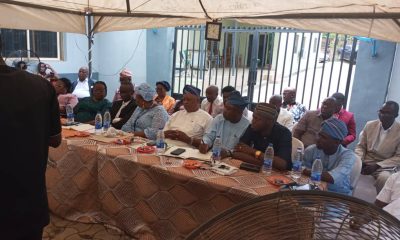
 News5 days ago
News5 days agoOsun RAAMP Opens Bid For Road Constructions Statewide
-

 News2 days ago
News2 days agoJust In: Nigerian Governor Dethrones 15 Traditional Rulers, Reinstates 7



